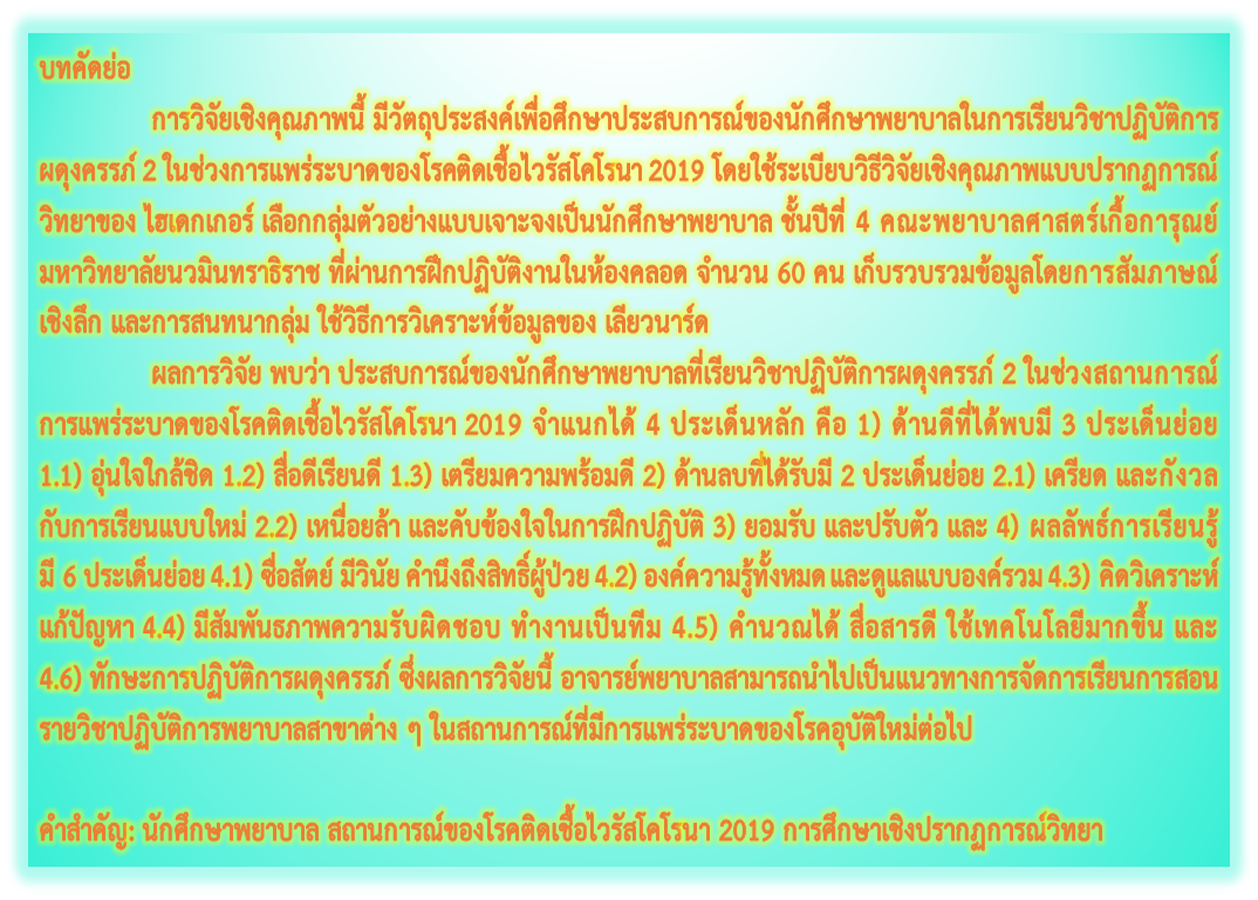ประสบการณ์ของนักศึกษาพยาบาลในการเรียนวิชาปฏิบัติการผดุงครรภ์ 2 ในช่วงการแพร่ระบาดของโรคติดเชื้อไวรัสโคโรนา 2019: การศึกษาเชิงปรากฏการณ์วิทยา
คำสำคัญ:
นักศึกษาพยาบาล, สถานการณ์ของโรคติดเชื้อไวรัสโคโรนา 2019, การศึกษาเชิงปรากฏการณ์วิทยาบทคัดย่อ
การวิจัยเชิงคุณภาพนี้ มีวัตถุประสงค์เพื่อศึกษาประสบการณ์ของนักศึกษาพยาบาลในการเรียนวิชาปฏิบัติการผดุงครรภ์ 2 ในช่วงการแพร่ระบาดของโรคติดเชื้อไวรัสโคโรนา 2019 โดยใช้ระเบียบวิธีวิจัยเชิงคุณภาพแบบปรากฏการณ์วิทยาของ ไฮเดกเกอร์ เลือกกลุ่มตัวอย่างแบบเจาะจงเป็นนักศึกษาพยาบาล ชั้นปีที่ 4 คณะพยาบาลศาสตร์เกื้อการุณย์ มหาวิทยาลัยนวมินทราธิราช ที่ผ่านการฝึกปฏิบัติงานในห้องคลอด จำนวน 60 คน เก็บรวบรวมข้อมูลโดยการสัมภาษณ์เชิงลึก และการสนทนากลุ่ม ใช้วิธีการวิเคราะห์ข้อมูลของ เลียวนาร์ด
ผลการวิจัย พบว่า ประสบการณ์ของนักศึกษาพยาบาลที่เรียนวิชาปฏิบัติการผดุงครรภ์ 2 ในช่วงสถานการณ์การแพร่ระบาดของโรคติดเชื้อไวรัสโคโรนา 2019 จำแนกได้ 4 ประเด็นหลัก คือ 1) ด้านดีที่ได้พบมี 3 ประเด็นย่อย 1.1) อุ่นใจใกล้ชิด 1.2) สื่อดีเรียนดี 1.3) เตรียมความพร้อมดี 2) ด้านลบที่ได้รับ มี 2 ประเด็นย่อย 2.1) เครียด และกังวลกับการเรียนแบบใหม่ 2.2) เหนื่อยล้า และคับข้องใจในการฝึกปฏิบัติ 3) ยอมรับ และปรับตัว และ 4) ผลลัพธ์การเรียนรู้มี 6 ประเด็นย่อย 4.1) ซื่อสัตย์ มีวินัย คำนึงถึงสิทธิ์ผู้ป่วย 4.2) องค์ความรู้ทั้งหมด และดูแลแบบองค์รวม 4.3) คิดวิเคราะห์ แก้ปัญหา 4.4) มีสัมพันธภาพ ความรับผิดชอบ ทำงานเป็นทีม 4.5) คำนวณได้ สื่อสารดี ใช้เทคโนโลยีมากขึ้น และ 4.6) ทักษะการปฏิบัติการผดุงครรภ์ ซึ่งผลการวิจัยนี้ อาจารย์พยาบาลสามารถนำไปเป็นแนวทางการจัดการเรียนการสอนรายวิชาปฏิบัติการพยาบาลสาขาต่าง ๆ ในสถานการณ์ที่มีการแพร่ระบาดของโรคอุบัติใหม่ต่อไป
เอกสารอ้างอิง
Srivachiraphat P. Strategies for mitigating Thai students’ learning losses from online teaching and learning during the COVID-19 pandemic. Mahidol University's Integrated Social Science Journal 2022;9(1):71-86. (in Thai)
Kuakarun Faculty of Nursing, Navamindradhiraj University. Announcement of the Kuakarun Faculty of Nursing Navamindradhiraj University subject guidelines for working at home for teachers and staff during the coronavirus disease 2019 (COVID-19) outbreak situation [Internet]. 2020 [cited 2020 Oct 1]. Available from: https://www.kcn.ac.th/storage/app/uploads/public/5e8/6f8/09d/5e86f809d1690333092147.pdf (in Thai)
Kuakarun Faculty of Nursing. Practicum in midwifery II academic year 2019. Bangkok: Kuakarun Faculty of Nursing; 2019. (in Thai)
Penrattanahiran R, Tantong A. Impact and coping strategies in online learning of students under the circumstances on covid-19 pandemic. Journal of Modern Learning Development 2022;7(4):208-33. (in Thai)
Jantavat P. Preparation of nursing student for stress relief during practice in delivery room. Kuakarun Journal of Nursing 2018;25(1):184-91. (in Thai)
Majrashi A, Khalil A, Nagshabandi EA, Majrashi A. Stressors and coping strategies among nursing students during the COVID-19 pandemic: scoping review. Nursing Reports 2021;11(2):444-59.
Lovrić R, Farčić N, Mikšić S, Včev A. Studying during the COVID-19 pandemic: a qualitative inductive content analysis of nursing students’ perceptions and experiences. Education Sciences 2020;7(10):188.
Baluwa MA, Konyani A, Chipeta MC, Munthali G, Mhango L, Chimbe E, et al. Coping with fears of covid-19 pandemic among nursing students during clinical practice: Malawi’s perspective. Advances in Medical Education and Practice 2021;12:1389-96.
Klaraeng W, Howharn C, Jiramanasawong A, Surataworn R. Lived experiences of nursing students in facing with the pandemic of COVID-19. Nursing, Health, and Education Journal 2022;5(2):21-33. (in Thai)
Melarplont S, Meebunmak Y. Happiness and quality of life to COVID-19 epidemic among nursing students, Boromarajonani College of Nursing Ratchaburi. The Journal of Boromarjonani College of Nursing, Suphanburi 2022;5(1):67-78. (in Thai)
Hamilton S, Meenongwah J, Pholperm A. Stress and stress management of nursing students at Boromarajonani College of Nursing, Sanpasithiprasong during the covid-19 pandemic situation. Journal of MCU Peace Studies 2022;10(5):1926-41. (in Thai)
Heidegger M. Being and time. Oxford: Blackwell; 1962.
Leonard VW. A Heideggerian phenomenologic perspective on the concept of the person. Advances in Nursing Science 1989;11(4):40-55.
Lincoln YS, Guba EG. Naturalistic inquiry. Newbury Park, CA: Sage Publications; 1985.
Wisanskoonwong P, Sawangtook S, Prammanee M. The development of reinforcement learning and teaching model through online media by using facebook group in midwifery 2. Journal of Nursing and Health Care 2020;38(1):97-106. (in Thai)
Farsi Z, Sajadi SA, Afaghi E, Fournier A, Aliyari S, Ahmadi Y, et al. Explaining the experiences of nursing administrators, educators, and students about education process in the COVID-19 pandemic: a qualitative study. BMC Nursing 2021;20:151.
Artiwitchayanon A, Srisopa P, Wacharasin C. Factors predicting nursing students’ learning outcomes through online learning during COVID-19 pandemic. Songklanagarind Journal of Nursing 2022;42(2):85-97. (in Thai)
Intaranongpai S, Kausit U, Tankasem L, Tipchart T, Sornboon A, Sungsuk N. Factors influencing the online learning outcome on fundamental nursing subject during COVID-19 pandemic of nursing students from Mahasarakham university. Princess of Naradhiwas University Journal 2022;14(3):252-66. (in Thai)

ดาวน์โหลด
เผยแพร่แล้ว
รูปแบบการอ้างอิง
ฉบับ
ประเภทบทความ
สัญญาอนุญาต
ลิขสิทธิ์ (c) 2022 วารสารเกื้อการุณย์

อนุญาตภายใต้เงื่อนไข Creative Commons Attribution-NonCommercial-NoDerivatives 4.0 International License.
















